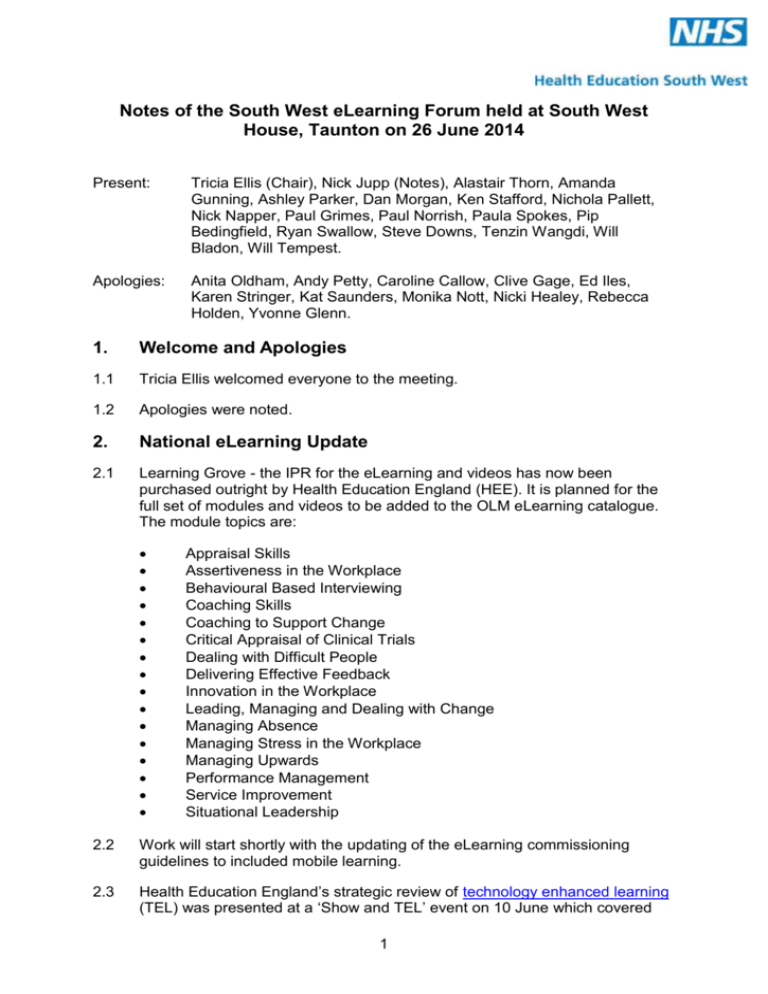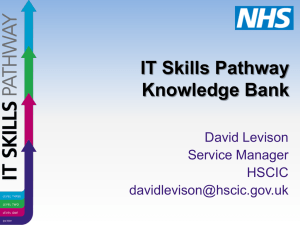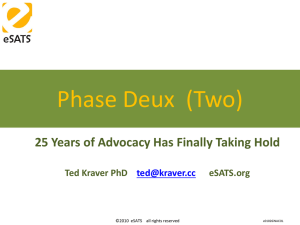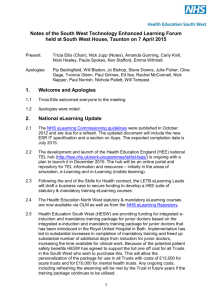SW eLearning Forum Notes 26 06 14
advertisement

Notes of the South West eLearning Forum held at South West House, Taunton on 26 June 2014 Present: Tricia Ellis (Chair), Nick Jupp (Notes), Alastair Thorn, Amanda Gunning, Ashley Parker, Dan Morgan, Ken Stafford, Nichola Pallett, Nick Napper, Paul Grimes, Paul Norrish, Paula Spokes, Pip Bedingfield, Ryan Swallow, Steve Downs, Tenzin Wangdi, Will Bladon, Will Tempest. Apologies: Anita Oldham, Andy Petty, Caroline Callow, Clive Gage, Ed Iles, Karen Stringer, Kat Saunders, Monika Nott, Nicki Healey, Rebecca Holden, Yvonne Glenn. 1. Welcome and Apologies 1.1 Tricia Ellis welcomed everyone to the meeting. 1.2 Apologies were noted. 2. National eLearning Update 2.1 Learning Grove - the IPR for the eLearning and videos has now been purchased outright by Health Education England (HEE). It is planned for the full set of modules and videos to be added to the OLM eLearning catalogue. The module topics are: Appraisal Skills Assertiveness in the Workplace Behavioural Based Interviewing Coaching Skills Coaching to Support Change Critical Appraisal of Clinical Trials Dealing with Difficult People Delivering Effective Feedback Innovation in the Workplace Leading, Managing and Dealing with Change Managing Absence Managing Stress in the Workplace Managing Upwards Performance Management Service Improvement Situational Leadership 2.2 Work will start shortly with the updating of the eLearning commissioning guidelines to included mobile learning. 2.3 Health Education England’s strategic review of technology enhanced learning (TEL) was presented at a ‘Show and TEL’ event on 10 June which covered 1 examples of work that will be included in the TEL Hub together with an exhibition to raise the profile the Hub that will be launched later this year. The Hub ‘statement of requirements’ has been developed prior to contracting via the national contract process. FAQs on the TEL programme can be accessed at: http://hee.nhs.uk/work-programmes/tel/tel-faqs/ 2.4 HEE is liaising with the DH Digital Leaders’ Forum and an Arm’s Length Body group to resolve IT issues across NHS. This strategic group will look at IT issues such as Wi-Fi access and access to You Tube etc. 2.5 The future of the Repository is still not decided in terms of how it fits or links to the Hub, however there will be continued funding for a national hosting solution for eLearning content and you are encouraged to continue to use the Repository and continue to upload content to it. 2.6 NHS Blood and Transplant (NHSBT). Initiative to ensure safe practice and reduce errors in transfusion medicine with plans to develop a blood component prescribing App. Plans in place to develop simulation training, to help reduce the length of time that it takes nurses to develop competencies relating to organ donation, thereby supporting the continued increase in the volume of organ donation in the UK. 2.7 eLearning for Healthcare are planning to develop some new eLearning courses, including emergency medicine. Other courses in the pipeline include medical problems in pregnancy and a revision of the venous thromboembolism (VTE) programme. The End of Life care content is being revised to remove reference to the Liverpool Care Pathway. The e-Dementia content is being revised by Bradford University. 2.8 HEE have started a procurement process to replace the eLfH LMS with a new platform that will incorporate both eLfH content as well as other national and regional content to create a central portal. This will allow all eLearning to be accessed via any LMS but still be tracked centrally on usage. There is no date for the availability of this new platform. 2.9 The Skills for Health Core Learning Unit eLearning usage is continuing to increase at a rate of 5%-10% year on year. The eLearning team has been finalising the move of the Core Skills Training Framework (CSTF) courses into the new templates with changes that needed amending from feedback received, and changes within legislation. This includes: Separating Manual Handling and Patient Manual Handling (as well as updates to the bank of question for Patient Manual Handling), to reflect the levels of the CSTF; Experts are finalising the sign off of changes for Infection Prevention, aligning it more closely with the levels of the CSTF. The new structure will include a level 1 and 2 for non-clinical staff, and a level 1 and 2 for clinical staff, to better fit the requirements of staff, and reflect the levels of the CSTF; Improvements to Conflict Resolution – streamlining the content and heightening the learning experience; 2 Fire Safety and Health & Safety had a few minor amendments made in the transfer; Equality & Diversity has been transferred and updated with any recent feedback that we have received. 3. OLM eLearning Update 3.1 ESR Changes: The 'Forgotten Username or Password' link has been removed from the eLearning Internet User Login Page as it is not required. UN1909 (7th May) – advised of change of address for Skills for Health server. Fraud Awareness content updated. 3.2 Release 23 (29th June): 3.3 Inclusion of course and contact data into ESRBI (this weekend). A tip will be added to the Certifications section of the Learner home page to remind a user that when a Certification has expired pressing the renew button will allow the related course to be played. The error message received when a learner attempts to play an expired Certification will have an additional line to remind the user that pressing the renew button will allow the related course to be played. An export button will be added for Certifications on the Enrolments and Subscriptions form. Standard Oracle reports for Certifications, and Forums and Chats will be added to the Learning Administration and Learning Instructor URPs. Future Developments: As per the National OLM SIG minutes, developments being investigated: Change to IAT process to allow an interactive notification allowing the role holder to review and amend competences transferring in. Oracle has been working with McKesson and the NHS Development Team to remove the dependency of JRE on eLearning Investigation has taken place into VPD level search criteria to essentially hide closed courses. (no timescale but also a reprocurement requirement) The ability to devolve learning administration to particular groups has been investigated, rather than only adding booking onto the instructor URP. This will require a local value set to be created by the system administrator and a new security profile and person level EIT set against the individual. The course and offering will need to be maintained centrally, but the new URP and security profile will enable the individual to access and amend the appropriate classes. 3 3.4 As per ESR News (15th April), the planned future requirements for the new ESR contract and service (that impact eLearning) include: 3.5 Organisations will be able to create a person record for an external learner, which will essentially be treated as a contingent worker. It will not be possible to add the individual to a payroll or add a grade, but competences can be assigned. LP advised that if the unique NHS ID could be matched with an employee on ESR then this will only be counted once for licence purposes, however this would not account for all external learners. New Learning Dashboards in BI are in progress. Enhanced User Interfaces (particularly at employee user level): Ease of navigation and search; Access to key information such as KPIs; Integration with Social Media; Web conferencing; Areas for messages and news. Access through mobile devices (e.g. tablets); The deployment of e-Learning content (from within the solution catalogue) to mobile technologies and through applications associated with the platforms (e.g. Apple, Android). Any e-Learning undertaken on these platforms must allow for full integration back into the ESR solution; Secure internet access (this is interdependent with the strategic direction taken by NHS HSCIC with regard to smartcards as an authentication method). Improvements to the ‘Shared Service’ functionality – allowing multiple VPDs to work as a single unit if they fall within an agreed and configured Shared Service arrangement; Full ‘field level’ audit – reportable at local level. This will include audit of who has ‘viewed’ a form as well as made amendments to the solution; Full integration between ESR ‘workflow’ and e-mail – delivering key notifications through NHS Mail to remove the need to ‘login’ to view any notifications. The Business Intelligence Reporting solution must be extended to include: Ability to deploy agreed KPI and threshold reporting to senior managers desktops through the means of a ‘portal’. These KPI’s should also be accessible from mobile devices; Ability to trigger alerts to a user desktop for key events – definable locally; Ability to benchmark at Regional/National Level; The single reporting solution must support macro level users (e.g. DH, NHSIC, etc.); Integration with non-ESR data (financial, patient) to become the central repository for reporting. Other Information: ESR Reprocurement Website updated to include: 4 Pre Invitation to Negotiate in late June. Shortlisted bidders to commence Invitation to Negotiate in early July. McKesson have withdrawn from reprocurement. Current contract extended to Nov 15. 4. eLearning Open Forum 4.1 At the last meeting the group agreed that it would be useful to have an eLearning manifesto for the south west. Nick Napper presented a Serious eLearning Manifesto that had been written in March 2014 by 4 influential eLearning bloggers. The manifesto can be accessed at: http://elearningmanifesto.org/ It was commented that Principle 16 would be difficult to adopt in terms of the lack of direct evidence to prove the benefits of eLearning. Action: ALL to review the manifesto principles and respond to Nick Jupp with feedback and / or an agreement to adopt the manifesto. 4.2 Safe use of insulin - the Virtual College has created a pricing structure for NHS trusts. Some have paid to retain access to the course but many organisations feel that cost is too high. Virtual College declined to sell the IPR to HEE. Taunton & Somerset Trust have been commissioned by the South West to carry out a rapid development of a replacement Safe Use of Insulin eLearning course. This course will cover the same learning requirements and have the same learning outcomes as the Virtual College course while at the same time not infringing any copyright. The completed course and the course files in Storyline format will be shared to enable each organisation to use either the generic version or to adapt the course locally to meet any specific organisational requirements. Will Bladon offered to help with local customisation work. The course files will be available via NHS secure file transfer. The course will be SCORM compliant so can be played through any learning management system including NLMS. The course duration will be 1 to 1½ hours with a renewal period of 12 months. The target date for completion is 11 July. Action: ALL to send contact details to Will Bladon if interested in receiving the files. 4.3 Catalogue of locally developed content has been updated to reflect the latest contributions from group members. The spreadsheet can be downloaded from the Health Education South West eLearning web page at: http://workforce.southwest.nhs.uk/elearning/e-learning/forum/ The password is: hiblio 4.4 The Training Foundation have launched an initiative to build eLearning capacity and capability across Wales using the TAP methodology and supported by the Technology Enabled Learning strategy in Wales. This strategy includes 5 strands: Up-skilling NHS tutors to design effective and engaging blended learning Building and supporting working practices with NHS subject matter experts 5 Develop bite-sized e-Learning self-study modules Creating robust Quality Assurance standards Developing a team of L&D professionals across NHS Wales to support the new TEL strategy 4.5 A four point plan was created to deliver the training which included quality assurance at every stage of the project. NHS Wales use Articulate Storyline tool to create all content. The Training Foundation have created 8 guidelines which can be read on pages 14 and 15 of the e-QUAL booklet (http://www.tap-training.com/about_tap/e-quality_assurance.html). People that have already completed the TAP eLearning design course can do a top up course. 4.6 Tricia Ellis set out a proposal for Health Education South West to fund a number of places on the e-QUAL programme. Those attending would be required to commit some time to be part of a South West network that would support and be a quality assessor for other organisations. An application process to encourage expressions of interest will be distributed in July 2014, with attendance on the e-QUAL programme to be completed by the end of 2014. Action: NJ to send out further information and details of the application process. 4.7 Learning4Health has been upgraded with enhancements to the portfolio functionality that allows users to create custom portfolios for situations such as appraisals, interviews and revalidation. Users can upload certificates in PDF, jpg or Word format and export their portfolio in a formatted, printable, PDF format. Enhancements to the search functionality are being developed and user testing will take place during August 2014 for implementation in September 2014. Action: ALL to contact Nick Jupp if able to assist with the user testing. 4.8 Video content embedded in Captivate courses was discussed. Amanda Gunning has created a film for junior doctors covering the use of medical gases. Advice is to download the video file into Adobe Premier Elements as this product contains the tools to convert and output the video film in the correct format required for Captivate. Will Bladon offered to provide support with converting video. 4.9 Massive On line Open Courses (MOOCs) were discussed. Tenzin Wangdi provided feedback from his experience as a learner and stated that a mix of synchronous and asynchronous delivery works best. There are excellent educational resources available free of charge with some courses suitable for health and social care staff. MOOC providers FutureLearn, Coursera and edX were thought of as providers of good quality education. 4.10 Openbadges were discussed as a new technology for recording course completion or competencies. The can be set with renewal periods where a top up is required for re-validation of the badge. 6 4.11 Alastair Thorn stated that his organisation has a requirement for online communities to support the delivery of training to remedy attendance rates at face to face sessions and to reduce the requirement for travel to training sessions. Some organisations do not allow WebEx licences to be purchased. The NHS have a contract with BT to provide WebEx via the N3 network (http://www.n3.nhs.uk/N3CloudServices/N3Unified/WebConferencing/default. cfm). Google Hangouts was mentioned as a useful tool that requires no licence or software that allows video calls with up to 10 people. 4.12 Paul Grimes stated that North Bristol NHS Trust are starting a new process where pay increments are linked to 100% compliance with mandatory training. Gloucestershire Care Services and Royal United Hospital Bath are also planning to adopt this approach. 5. Any Other Business 5.1 None. 6. Workshop and presentations 6.1 Paul Norrish delivered a presentation on how South Devon Healthcare carried out a LMS review. The key requirements for the organisation are to make content easily available especially outside of the organisation using a device of the user’s own choice. 6.2 Paul Norrish gave an update on Hiblio. A fire safety lecture to over 100 staff is planned and the details will be circulated for all to have the opportunity to participate and evaluate. 7. Dates of Next Meeting 7.1 Thursday 9 October 2014, 10:00–15:30, Meeting Room 1, South West House 7






